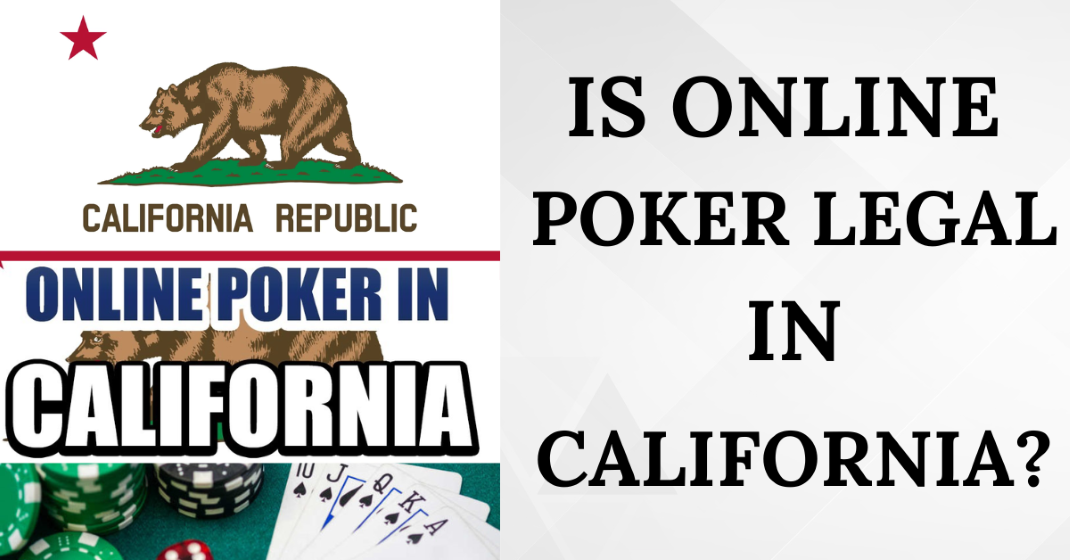Is Online Poker Legal in California? Know Poker Laws

Online poker exploded in popularity in the early 2000s, but is online poker legal in California or not? Its legal status has remained complicated due to state and federal laws. Only a handful of states, including Nevada, New Jersey and Pennsylvania, have legal, regulated real money online poker. With over 40 million residents, California represents an enormous potential market for online poker. However, despite multiple attempts dating back over 15 years, legislative efforts to legalise online poker have been unsuccessful. This article will examine online poker’s complex history and current legal status in California and assess the outlook for future legalisation efforts.
CURRENT LEGAL STATUS OF ONLINE POKER IN CALIFORNIA

| Type | Legality | Summary |
| Playing online poker | Illegal | Violates state gambling laws, but no player prosecutions to date |
| Operating an online poker site | Illegal | This could result in criminal charges for unauthorised gambling operations. |
| Offshore online poker sites | Illegal | Violate state/federal laws but still allow California players |
| Social & sweepstakes poker | Legal | Use virtual currencies so no gambling for real money occurs |
| Home poker games | Legal | No law prohibits private social games with no rake/fees taken |
1. State Legislation on Online Poker
The California Penal Code contains explicit language prohibiting real-money online poker games under Section 330: “Every person who…plays or bets at or against any…prohibited game…is guilty of a misdemeanour…” The Code defines prohibited games as including “any poker game.”
Without legislative action creating a framework to license, regulate and authorise online poker, such games remain illegal according to the letter of California law. So far, all attempts to pass bills doing so have failed.
2. Federal Laws Affecting Online Poker
Federal statutes also directly impact the legal status of online poker in California and all other states. The Unlawful Internet Gambling Enforcement Act of 2006 (UIGEA) did not expressly make online gambling illegal. Still, it did prohibit financial institutions from processing payments related to “unlawful internet gambling” per existing federal and state laws.
Then, in 2011, a US Department of Justice crackdown against the three largest poker sites offering games to US customers, dubbed “Black Friday,” essentially eliminated real money online poker across most of America. Some regulated state-level markets have since emerged, but California still prohibits sites from operating within its borders.
3. Interpretation of Existing Laws
Simply playing peer-to-peer poker online by itself does not constitute operating a gaming business. So, individual players likely avoid criminal liability, though their activity still violates gambling laws. However, prosecutors have targeted owners of sites conducting unlawful gambling operations or related financial transactions. Current laws do not allow online poker sites to legally offer real money games within California or apply for gambling licenses.
ONLINE POKER OPTIONS FOR CALIFORNIANS
Some offshore online poker sites still allow California players to deposit, play games, and withdraw winnings. However, these sites operate illegally without licenses and have faced fraud allegations. Playing on them carries financial and legal risks without regulatory protections in place.
Like Global Poker, these use virtual currencies and sweepstakes models to offer legal online poker in California. Players can redeem their winnings for real-world value. While popular, the game offerings are still limited compared to real online poker. Due to gambling restrictions both sites may not be available in all regions.
Signing up and playing poker on an offshore or social poker site does not mean players will necessarily face prosecution. Violations of gambling laws technically result in fines or criminal charges. Still, unregulated sites provide no legal recourse if issues arise.
HOME POKER GAMES IN CALIFORNIA

EFFORTS TOWARDS LEGALIZATION
A. Legislative Attempts
Lawmakers have tried unsuccessfully since 2008 to pass California online poker legislation:
- Early bills focused on approving intrastate online networks limited to state residents.
- Recent attempts tried compensating tribal casinos and card rooms for lost revenues.
However, conflicts between stakeholders have derailed all efforts so far.
B. Stakeholder Interests and Conflicts
Various parties have attempted but failed to align behind shared online poker legislation:
- Native American tribal groups want exclusivity protections for their casino gaming revenues.
- Cardrooms argue the market should be open to operators beyond just tribes.
- Online gaming companies have tried gaining inclusion through lobbying.
- Racetracks have pushed for licensing eligibility as potential online providers.
Debates over “bad actor” clauses excluding companies like PokerStars have also hindered consensus.
C. Predictions and Future Prospects
It remains unlikely California will pass online poker legislation until after:
- Settling debates over legalising sports betting
- Conducting voter referendum on tribal gaming compact amendments
- Addressing the potential impact on tax revenues
Once those issues progress, revisiting online poker legalisation becomes more viable, possibly in 2024 or 2025.
LEGAL ONLINE POKER ALTERNATIVES
Playing remains the sole legally approved option for Californians. The site uses geolocation to ensure players are within Nevada state lines when accessing real money games. Unlicensed poker sites results in legal and financial risks.
Some regulated online poker sites based overseas allow players from California and other US states due to separate legal frameworks. However, those sites still violate local laws. Players on international sites forfeit protections from California and federal gambling regulators.
While legally complex, Californians playing on licensed sites in other US states with proper geo-restrictions can have confidence those sites offer accountability and security regarding their gaming services. Unregulated international sites carry higher risks.
PLAYER RESPONSIBILITY aND LEGAL COMPLIANCE
A. Understanding State and Federal Laws
The complex patchwork of laws makes determining the actual legality of online poker complex for average players. Perceived loopholes allowing offshore sites or even home games to operate do not automatically make them lawful or risk-free.
B. Risks of Playing on Unregulated Sites
California players should understand the pitfalls of using offshore poker sites, including:
- Few protections against fraud or gaming manipulation
- No guarantees funds are secure
- An inability to verify game integrity
Violations of state and federal laws also open players up to potential criminal liability.

C. Responsible Gaming Practices
Regardless of legal status, players should exercise discretion by:
THE ECONOMIC IMPACT oF LEGALIZING ONLINE POKER iN CALIFORNIA
1. Potential Revenue and Tax Benefits
According to industry projections, as the largest US state, a regulated online poker market in California could generate $297 million to even over $750 million annually in tax revenues. Even tax rates ranging from 5-15% would raise substantial funding for state programs and services.
2. Job Creation and Economic Growth
Developing a new, legal intrastate online poker system requiring hardware, software, and personnel infrastructure could lead to thousands of high-paying direct and indirect jobs for Californians. Further economic benefits would also likely spill into surrounding communities.
3. Case Studies from Other States
New Jersey’s online gambling market has dealt with declining revenues lately but still brought in over $118 million in taxes on over $1.2 billion in total revenues since launching in 2013. Pennsylvania has collected over $80 million in gaming taxes since 2019. Regulated online poker and gambling hold significant economic potential.
PUBLIC OPINION aND SOCIAL PERSPECTIVES
A. Public Support for Legalization
Recent polls of California residents consistently show 60-70% or higher public support for regulating and taxing authorised online poker sites. Voters recognise the current grey market situation and the potential benefits of moving activity onto legal platforms.
B. Concerns and Opposition
- Critics argue easier access increases problem gambling rates.
- Some tribes remain hesitant to avoid cannibalising casino revenues
- Social conservatives object to enabling “sinful” industries
However, actual evidence linking regulated online gambling to gambling disorders remains minimal. Proper, responsible gaming features can mitigate issues.
C. Role of Media and Public Campaigns
Ongoing coverage explaining online poker legislation details and debates has increased Californians’ familiarity with the complex issues involved. Public campaigns led by players and poker companies have boosted legalisation support through advocacy and lobbying. Continuing these education efforts could create needed momentum.
CONCLUSION
Aside from free-to-play sites, Californians have no state-approved real-money online poker options. Offshore sites continue catering to the market but violate state and federal laws. Home games remain the lone entirely lawful form of poker under specific conditions. With legislative efforts on pause, California’s legalisation of online poker soon seems improbable. Sports betting has taken centre stage while tribal compacts also occupy lawmakers’ focus. Once those play out over the next 1-2 years, reopening consideration for regulating online poker becomes more realistic.






